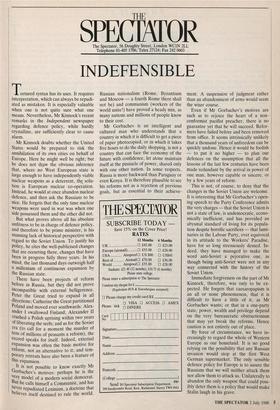THE
SPECTATOR
The Spectator, 56 Doughty Street, London WC1N 2LL Telephone 01-405 1706; Telex 27124; Fax 242 0603
INDEFENSIBLE
Tortured syntax has its uses. It requires interpretation, which can always be repudi- ated as mistaken. It is especially valuable when one is not quite sure what one means. Nevertheless, Mr Kinnock's recent remarks in the Independent newspaper regarding defence policy, while hardly crystalline, are sufficiently clear to cause alarm.
Mr Kinnock doubts whether the United States would be prepared to risk the annihilation of its own cities on behalf of Europe. Here he might well be right; but he does not draw the obvious inference that, where no West European state is large enough to have independently viable nuclear weapons as a deterrent, the solu- tion is European nuclear co-operation. Instead, he would at once abandon nuclear defence, and then ask the Russians to be nice. He forgets that the only time nuclear weapons were used in war was when one side possessed them and the other did not.
But what proves above all his absolute unfitness to be in charge of defence policy, and therefore to be prime minister, is his stunning lack of historical perspective with regard to the Soviet Union. To justify his Policy, he cites the well-publicised changes that are occurring there, changes that have been in progress fully three years. In his mind, the last thousand days outweigh half a millenium of continuous expansion by the Russian state. There have been projects a reform before in Russia, but they did not prove incompatible with external belligerence. Peter the Great tried to expand in all directions; Catherine the Great partitioned Poland and moved ever southwards: Alex- ander I swallowed Finland; Alexander II crushed a Polish uprising within two years of liberating the serfs; and as for the Soviet era (to call for a moment the murder of tens of millions of peasants a reform), the record speaks for itself. Indeed, external expansion was often the basic motive for reform, not an alternative to it; and tem- porary retreats have also been a feature of this expansion. It is not possible to know exactly Mr Gorbachev's motives: perhaps he is the very model of a modern social democrat. But he calls himself a Communist, and has never repudiated Leninism, a doctrine that believes itself destined to rule the world. Russian nationalism (Rome, Byzantium and Moscow — a fourth Rome there shall not be) and communism (workers of the world unite!) have proved a heady mix, as many nations and millions of people know to their cost.
Mr Gorbachev is an intelligent and cultured man who understands that a country in which it is difficult to get a piece of paper photocopied, or in which it takes five hours to do the daily shopping, is not a country that can face the economy of the future with confidence, let alone maintain itself at the pinnacle of power, shared only with one other nation. In some respects, Russia is more backward than Paraguay or even Kenya. It is therefore plausible to see his reforms not as a rejection of previous goals, but as essential to their achieve- ment. A suspension of judgment rather than an abandonment of arms would seem the wiser course.
Even if Mr Gorbachev's motives are such as to rejoice the heart of a non- conformist pacifist preacher, there is no guarantee yet that he will succeed. Refor- mers have failed before and been removed from office. It seems intrinsically unlikely that a thousand years of unfreedom can be quickly undone. Hence it would be foolish — to put it no higher — to plan our defences on the assumption that all the lessons of the last few centuries have been made redundant by the arrival in power of one man, however capable or sincere, or by a few years of reform.
This is not, of course, to deny that the changes in the Soviet Union are welcome. It is interesting that Mr Gorbachev's open- ing speech to the Party Conference admits the very charges — that the Soviet Union is not a state of law, is undemocratic, econo- mically inefficient, and has provided an abysmal standard of living for its popula- tion despite horrific sacrifices — that lumi- naries in the Labour Party, ever equivocal in its attitude to the Workers' Paradise, have for so long strenuously denied. In- deed, they have managed to make the word anti-Soviet a pejorative .one, as though being anti-Soviet were not in any way connected with the history of the Soviet Union.
Immediate forgiveness on the part of Mr Kinnock, therefore, was only to be ex- pected. He forgets that caesaropapism is an all or none phenomenon, that it is difficult to have a little of it, as Mr Gorbachev wants; or that in a one-party state, power, wealth and privilege depend on the very bureaucratic obstructionism that may yet break the reforms. Hence caution is not entirely out of place.
By force of circumstance, we have in- creasingly to regard the whole of Western Europe as our homeland. It is no good relying on the possibility that any Russian invasion would stop at the first West German supermarket. The only sensible defence policy for Europe is to assure the Russians that we will neither attack them nor allow them to attack us. Unilaterally to abandon the only weapon that could poss- ibly deter them is a policy that would make Stalin laugh in his grave.














































 Previous page
Previous page